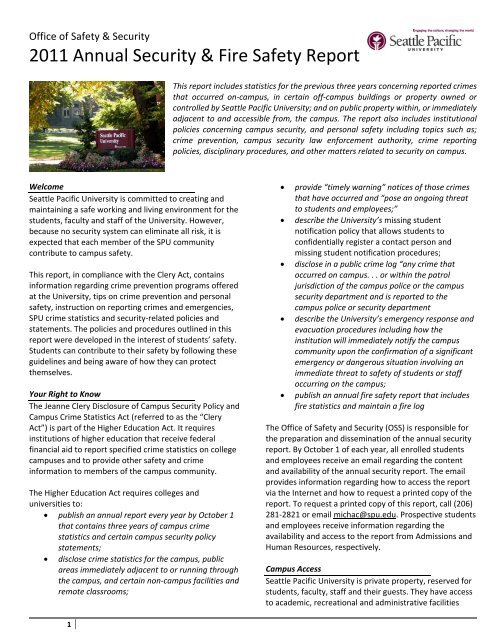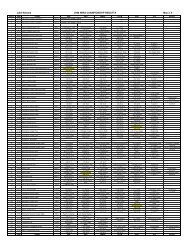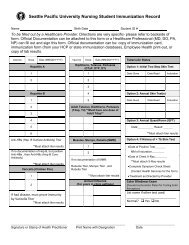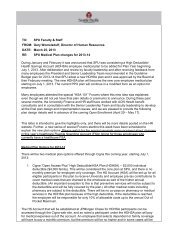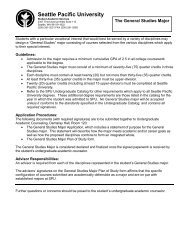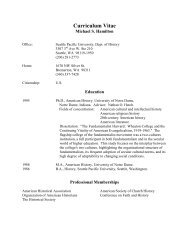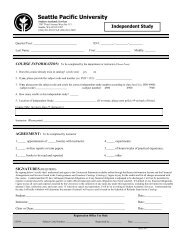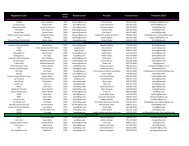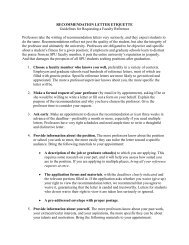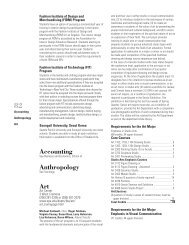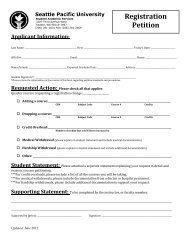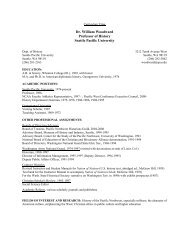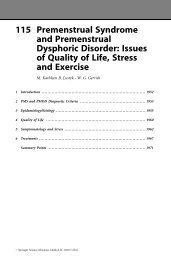2011 Annual Security & Fire Safety Report - Seattle Pacific University
2011 Annual Security & Fire Safety Report - Seattle Pacific University
2011 Annual Security & Fire Safety Report - Seattle Pacific University
Create successful ePaper yourself
Turn your PDF publications into a flip-book with our unique Google optimized e-Paper software.
Office of <strong>Safety</strong> & <strong>Security</strong><br />
<strong>2011</strong> <strong>Annual</strong> <strong>Security</strong> & <strong>Fire</strong> <strong>Safety</strong> <strong>Report</strong><br />
This report includes statistics for the previous three years concerning reported crimes<br />
that occurred on‐campus, in certain off‐campus buildings or property owned or<br />
controlled by <strong>Seattle</strong> <strong>Pacific</strong> <strong>University</strong>; and on public property within, or immediately<br />
adjacent to and accessible from, the campus. The report also includes institutional<br />
policies concerning campus security, and personal safety including topics such as;<br />
crime prevention, campus security law enforcement authority, crime reporting<br />
policies, disciplinary procedures, and other matters related to security on campus.<br />
Welcome<br />
<strong>Seattle</strong> <strong>Pacific</strong> <strong>University</strong> is committed to creating and<br />
maintaining a safe working and living environment for the<br />
students, faculty and staff of the <strong>University</strong>. However,<br />
because no security system can eliminate all risk, it is<br />
expected that each member of the SPU community<br />
contribute to campus safety.<br />
This report, in compliance with the Clery Act, contains<br />
information regarding crime prevention programs offered<br />
at the <strong>University</strong>, tips on crime prevention and personal<br />
safety, instruction on reporting crimes and emergencies,<br />
SPU crime statistics and security‐related policies and<br />
statements. The policies and procedures outlined in this<br />
report were developed in the interest of students’ safety.<br />
Students can contribute to their safety by following these<br />
guidelines and being aware of how they can protect<br />
themselves.<br />
Your Right to Know<br />
The Jeanne Clery Disclosure of Campus <strong>Security</strong> Policy and<br />
Campus Crime Statistics Act (referred to as the “Clery<br />
Act”) is part of the Higher Education Act. It requires<br />
institutions of higher education that receive federal<br />
financial aid to report specified crime statistics on college<br />
campuses and to provide other safety and crime<br />
information to members of the campus community.<br />
The Higher Education Act requires colleges and<br />
universities to:<br />
publish an annual report every year by October 1<br />
that contains three years of campus crime<br />
statistics and certain campus security policy<br />
statements;<br />
disclose crime statistics for the campus, public<br />
areas immediately adjacent to or running through<br />
the campus, and certain non‐campus facilities and<br />
remote classrooms;<br />
<br />
<br />
<br />
<br />
<br />
provide “timely warning” notices of those crimes<br />
that have occurred and “pose an ongoing threat<br />
to students and employees;”<br />
describe the <strong>University</strong>’s missing student<br />
notification policy that allows students to<br />
confidentially register a contact person and<br />
missing student notification procedures;<br />
disclose in a public crime log “any crime that<br />
occurred on campus. . . or within the patrol<br />
jurisdiction of the campus police or the campus<br />
security department and is reported to the<br />
campus police or security department<br />
describe the <strong>University</strong>’s emergency response and<br />
evacuation procedures including how the<br />
institution will immediately notify the campus<br />
community upon the confirmation of a significant<br />
emergency or dangerous situation involving an<br />
immediate threat to safety of students or staff<br />
occurring on the campus;<br />
publish an annual fire safety report that includes<br />
fire statistics and maintain a fire log<br />
The Office of <strong>Safety</strong> and <strong>Security</strong> (OSS) is responsible for<br />
the preparation and dissemination of the annual security<br />
report. By October 1 of each year, all enrolled students<br />
and employees receive an email regarding the content<br />
and availability of the annual security report. The email<br />
provides information regarding how to access the report<br />
via the Internet and how to request a printed copy of the<br />
report. To request a printed copy of this report, call (206)<br />
281‐2821 or email michac@spu.edu. Prospective students<br />
and employees receive information regarding the<br />
availability and access to the report from Admissions and<br />
Human Resources, respectively.<br />
Campus Access<br />
<strong>Seattle</strong> <strong>Pacific</strong> <strong>University</strong> is private property, reserved for<br />
students, faculty, staff and their guests. They have access<br />
to academic, recreational and administrative facilities<br />
1
during specific hours and class schedules. This access is<br />
given only to those who adhere to the social and<br />
behavioral expectations set forth in the student and staff<br />
handbooks; it may be revoked at any time.<br />
All special events scheduled for the campus must have<br />
prior authorization. Some campus events may require the<br />
presence of security officers. Contact the Office of<br />
Student Life for information on special event policies and<br />
procedures.<br />
Access to residence halls is restricted to students, their<br />
guests and those staff members who have job‐related<br />
business in the halls. Strict control of keys also limits<br />
access; when keys are reported lost, room locks are<br />
changed. In addition, a system of locked security doors<br />
can be opened only with student room keys or card<br />
access. Propping security or fire doors open is not allowed<br />
and failure to obey this rule may result in disciplinary<br />
action. <strong>Security</strong> officers check doors several times each<br />
day to enforce this policy and to detect malfunctions.<br />
Problems are reported immediately to the Office of<br />
Building Maintenance (206) 281‐2330 for correction.<br />
Residence hall floor areas are segregated by gender and<br />
have hours which limit visitation by the opposite sex.<br />
Overnight visits by guests of the opposite sex are not<br />
permitted and other guests must limit their stay to three<br />
days, except by permission of the hall staff. Guests are<br />
expected to follow the same behavioral standards as the<br />
residents. For visitor convenience and resident safety,<br />
residence hall lobbies are open from 7 a.m. to 11 p.m. and<br />
are equipped with phones so that visitors can call<br />
students.<br />
The campus is well‐lighted but periodic reviews are made<br />
to examine use patterns, determining where<br />
improvements may be needed. Each month OSS<br />
completes an exterior lighting report to detect and report<br />
malfunctions. Also, older lighting fixtures are<br />
systematically upgraded to improve reliability and<br />
efficiency. Landscaping is reviewed as well, reducing<br />
opportunities for concealment and to avoid conflicts with<br />
lighting systems.<br />
Office of <strong>Safety</strong> & <strong>Security</strong><br />
The Office of <strong>Safety</strong> and <strong>Security</strong> (OSS) is a private security<br />
organization which patrols campus buildings and grounds<br />
by foot and in cars 24 hours a day, seven days a week.<br />
Officers do not have deputized or state‐commissioned<br />
police authority and carry no firearms, but they do make<br />
citizen's arrests when appropriate. In addition, they work<br />
closely with the <strong>Seattle</strong> Police Department in the<br />
investigation of all crimes reported on campus. <strong>Security</strong><br />
officers are available 24 hours a day and will respond to<br />
all emergencies. They also render immediate aid,<br />
investigate incidents and complete reports for<br />
administrative follow‐up. Students are also encouraged to<br />
report crimes to the <strong>Seattle</strong> Police Department. The<br />
<strong>Seattle</strong> Police and <strong>Fire</strong> Departments may be reached<br />
directly by dialing 911 from any campus phone. However,<br />
by dialing the campus emergency number, 2911, OSS can<br />
immediately identify the building from which you are<br />
calling and security officers will then report to police or<br />
fire with accurate information. These officers can also<br />
render immediate aid in an emergency.<br />
Officer qualifications include attendance at the<br />
Washington Campus Law Enforcement Training Academy,<br />
certification in first aid and CPR, as well as fire brigade<br />
and self‐defense training.<br />
Timely Warning Policy<br />
It is the policy of the <strong>University</strong> to issue emergency<br />
notification alerts in an effort to notify community<br />
members about certain crimes in and around our<br />
community in a timely manner. For the purposes of this<br />
policy, "timely manner" means that upon confirmation by<br />
OSS the campus community will be immediately notified<br />
of any significant emergency or dangerous situation<br />
involving an immediate threat to the health or safety of<br />
students or staff.<br />
The Director of <strong>Safety</strong> and <strong>Security</strong> will consult, as<br />
appropriate and necessary, with other <strong>University</strong> officials<br />
regarding whether a timely warning should be issued. The<br />
decision to issue a timely warning shall be made on a<br />
case‐by‐case basis after consideration of the available<br />
facts, including factors such as the nature of the crime,<br />
the continuing danger or risk to the campus community,<br />
and the possible risk of compromising law enforcement<br />
efforts.<br />
When a determination is made that a timely warning<br />
should be issued, OSS will take appropriate steps to<br />
ensure timely notification of the campus community. The<br />
<strong>University</strong> has various systems in place for communicating<br />
information quickly to the campus community. These<br />
methods of communication include the <strong>University</strong>’s mass<br />
notification system (SPU‐Alert), an outdoor public address<br />
system, emergency messages that scroll across electronic<br />
reader boards, campus‐wide e‐mails, physical postings on<br />
doors, and announcements by Building Emergency<br />
Coordinators or the SPU website.<br />
2
Anyone with information warranting a timely warning<br />
should report the circumstances to OSS at (206) 281‐<br />
2911. Call extension 2911 on campus. Call 2922 for nonemergencies.<br />
SPU Alert: Mass Emergency Notification System<br />
The SPU‐Alert System is a communication tool used to<br />
notify the campus community about any situation or<br />
condition that could threaten the safety of individuals on<br />
campus. In the event of an actual emergency, the SPU‐<br />
Alert System allows SPU officials to send nearly<br />
simultaneous messages via cell phone text messaging,<br />
email, and telephone.<br />
To be fully effective this system needs the cooperation of<br />
all faculty, staff and students to provide appropriate<br />
personal contact information for emergency notification.<br />
Members of the SPU community can enroll by accessing<br />
the Banner System on the web at<br />
https://www.spu.edu/banweb/ and selecting the SPU‐<br />
Alert option under the Personal Menu page. The CIS Help<br />
Desk can provide technical assistance if needed.<br />
Tests of the system will be conducted at least annually by<br />
OSS and the CIS department.<br />
Emergency Contact Information<br />
All <strong>University</strong> constituents are encouraged to add or<br />
update their Emergency Contact Information. While the<br />
SPU‐Alert systems identifies how to contact the<br />
community member in the event of a campus emergency,<br />
the Emergency Contact Information identifies who should<br />
be contacted if something happens to the community<br />
member. It is accessed from the same Personal Menu<br />
page describes above; it is located above the SPU‐Alert<br />
link.<br />
In addition to registering an emergency contact, students<br />
residing in on‐campus housing have the option to identify<br />
confidentially an individual to be contacted by SPU in the<br />
event the student is determined to be missing for more<br />
than 24 hours. If a student has identified such an<br />
individual, SPU will notify that individual no later than 24<br />
hours after the student is determined to be missing.<br />
Students who wish to identify a confidential contact can<br />
do so through the Banner Information System. See the<br />
Missing Person Policy for more information.<br />
Additional Emergency/Medical Information<br />
Individuals may also wish to make personal health<br />
information available for use by emergency responders in<br />
the event of a personal emergency. Supplying personal<br />
health information is voluntary for each employee.<br />
However, those individuals who have specific health<br />
issues or information they would like emergency<br />
responders to know about may take advantage of this<br />
opportunity to do so. To provide this information select<br />
the "Additional Emergency/Medical Information" link on<br />
the bottom of the Emergency Contact Information page.<br />
Access to this data will be strictly limited to <strong>Safety</strong> and<br />
<strong>Security</strong> staff to assist in responding to an emergency and<br />
will not be forwarded to any other person or department.<br />
Federal Campus Sex Crimes Prevention Act<br />
The new Campus Sex Crimes Prevention Act beginning in<br />
2002 requires states to ask every registered sex offender<br />
if they are enrolled at or employed by a college or<br />
<strong>University</strong>. In addition, pursuant to RCW 9A.44.130, any<br />
such adult or juvenile offender who is admitted to a<br />
public or private institution of higher education shall,<br />
within ten days of enrolling or by the first business day<br />
after arriving at the institution, whichever is earlier, notify<br />
the sheriff for the county of the person's residence of the<br />
person's intent to attend the institution. Students and<br />
employees can find out information about registered sex<br />
offenders in their area through the King County Sheriff's<br />
Office website. www.metrokc.gov/sheriff/services/sex_offender_search/<br />
Members of the SPU community can find out information<br />
about registered sex offenders (if any) enrolled at or<br />
employed by SPU by calling the <strong>Seattle</strong> Police<br />
Department, Sex and Kidnapping Registration Detail (SPD)<br />
at (206) 684‐5332. At this time, SPD has the most current<br />
information regarding registered sex offenders within the<br />
City of <strong>Seattle</strong>. SPD will be able to tell you whether there<br />
are any registered sex offenders enrolled at or employed<br />
by SPU, but may decide not to provide you the identity of<br />
any Level 1 offenders unless you demonstrate a need to<br />
know, or provide a specific name to be checked.<br />
Crime Log Information<br />
<strong>Seattle</strong> <strong>Pacific</strong> <strong>University</strong> provides crime statistics to<br />
prospective students, matriculated students and<br />
employees. The Office of <strong>Safety</strong> and <strong>Security</strong> (OSS) makes<br />
the crime log for the most recent 60 day period open to<br />
public review during normal business hours, Monday<br />
through Friday, excepting holidays. Any portion of the log<br />
beyond 60 days, if not immediately available, will be<br />
made accessible within two business days of a request for<br />
public inspection. The <strong>University</strong>’s student newspaper,<br />
The Falcon, publishes a crime blotter on a regular basis.<br />
Emergency Telephones<br />
Emergency assistance call boxes are conveniently located<br />
throughout campus in well‐lighted areas for requesting<br />
emergency assistance and for alerting OSS of a crime or<br />
3
suspicious activity. Emergency phones are installed<br />
outside the main entrances to residence halls, most<br />
elevators and most parking lots.<br />
<strong>Safety</strong> Escort Service<br />
The Office of <strong>Safety</strong> and <strong>Security</strong> (OSS) operates a safety<br />
escort service 24 hours a day, 365 days a year. An escort<br />
can be obtained by dialing ‘2922’ on any campus phone or<br />
at (206)281‐2922 from a cell phone.<br />
Personal <strong>Safety</strong> Education<br />
The Office of <strong>Safety</strong> and <strong>Security</strong> (OSS) sponsors free selfdefense<br />
classes for female students as well as faculty and<br />
staff. These programs are presented by nationally<br />
certified instructors with Rape Aggression Defense<br />
Systems. The Rape Aggression Defense System (RAD) is a<br />
program of realistic self‐defense tactics and techniques<br />
for women. The RAD System is a comprehensive, womenonly<br />
course that begins with awareness, prevention, risk<br />
reduction and risk avoidance, while progressing on to the<br />
basics of hands‐on defense training. For more<br />
information, contact OSS at (206)281‐2922.<br />
Alcohol & Drugs<br />
<strong>Seattle</strong> <strong>Pacific</strong> <strong>University</strong> is subject to the requirements of<br />
the federal Drug‐Free Workplace Act of 1988 and the<br />
Drug‐Free Schools and Communities Act of 1989. The<br />
<strong>University</strong> strongly supports each act and consistently<br />
ensures compliance with them. Each year, the <strong>University</strong><br />
distributes information to students, faculty and staff<br />
regarding the restrictions and consequences of violations<br />
of each act. Any employee or student who has not<br />
received copies of the statement should contact the<br />
<strong>University</strong> Admissions.<br />
This information is available to others in the SPU "Drug‐<br />
Free Campus" brochure. It offers details on the health<br />
risks, legal sanctions and treatment options related to<br />
alcohol and drugs. Copies of this brochure are available at<br />
the following campus locations: Office of <strong>Safety</strong> and<br />
<strong>Security</strong>; Student Counseling; Health Services; Office of<br />
Student Life; Uni‐Com; Office of Admissions; and the<br />
Office of <strong>University</strong> Relations.<br />
The <strong>University</strong> does not permit faculty, staff, or students<br />
to unlawfully possess, use, or distribute illicit drugs or<br />
alcohol or to use alcoholic beverages on its property or as<br />
part of any of its activities. Such possession, use, or<br />
distribution will be grounds for disciplinary action, up to<br />
and including termination/expulsion, and referral for<br />
prosecution. An employee or student who, while on the<br />
SPU property or at any <strong>University</strong> activity, exhibits<br />
objective signs of having consumed intoxicating beverages<br />
or illicit drugs will be placed on immediate suspension. If<br />
the observed behavior is a result of drug abuse or alcohol<br />
use, the employee/student will be subject to further<br />
disciplinary action. Employees should refer to the Alcohol,<br />
Tobacco, and Drug Use Policy (in the faculty and staff<br />
handbooks) and students to the student handbook for<br />
further detail.<br />
Any such incident will be documented and reported to the<br />
Dean of Students in the Office of Student Life (regarding<br />
students) or Human Resources (regarding employees) and<br />
to the President's Office. The disciplinary action taken will<br />
be reviewed and approved by the President or his<br />
designate.<br />
Supervisors will immediately document any incident of<br />
substance abuse or drug/tobacco use in violation of the<br />
restrictions listed above. The documentation is to be<br />
forwarded within 72 hours to the Dean of Students in the<br />
Office of Student Life (regarding students) or Human<br />
Resources (regarding employees) and to the President's<br />
Office. The disciplinary action taken will be reviewed and<br />
approved by the President or his designate.<br />
If an employee or student is required to complete a drug<br />
treatment and rehabilitation program as part of the<br />
disciplinary action resulting from a violation or this policy,<br />
official records of the diagnosis or treatment will be kept<br />
for three years, separate from the standard Human<br />
Resources or student records. The file will be held in the<br />
strictest confidence and will only be used as evidence to<br />
governmental and granting agencies that the <strong>University</strong><br />
did in fact take steps toward correcting the problem.<br />
Crime <strong>Report</strong>ing & Statistics<br />
Prospective students, employees, and visitors to the<br />
<strong>University</strong> should know that as with any campus, there is<br />
crime both on‐ and off‐campus and that it is important to<br />
take reasonable precautions at all times. Students, staff<br />
and faculty are strongly encouraged to report all crimes or<br />
suspicious activity to the Office of <strong>Safety</strong> and <strong>Security</strong><br />
(OSS). The officers will conduct a thorough investigation<br />
of all incidents and offenses. The identity of<br />
complainant(s), victim(s), and witness(es) will be kept<br />
confidential to the extent possible. Arrests will be made, if<br />
warranted. Criminal reports are filed and meet the<br />
Uniform Crime <strong>Report</strong>ing (U.C.R.) standards.<br />
To report a police, fire, or medical emergency call OSS by<br />
dialing 2911 from a campus phone or (206) 281‐2911<br />
from a cell or off‐campus phone. For non‐emergency<br />
business calls dial 2922 from campus phones or (206) 281‐<br />
2922 from cell or off‐campus phones. Campus community<br />
4
members are encouraged to program the <strong>Security</strong><br />
information and emergency lines into cell phones to<br />
reduce emergency response time. An OSS dispatcher is<br />
on‐duty at all times to provide assistance.<br />
Many SPU graduate and professional students and a<br />
number of undergraduate students live away the campus.<br />
OSS handles investigations of crimes at all <strong>University</strong>owned<br />
or operated facilities located within a reasonable<br />
distance from the main campus in conjunction with the<br />
<strong>Seattle</strong> Police Department. Matters occurring at<br />
properties that are more distant from the main campus<br />
may be handled entirely by the local law enforcement<br />
agency with jurisdiction.<br />
The Office of safety and <strong>Security</strong> (OSS) monitors offcampus<br />
criminal activity that may affect the <strong>University</strong><br />
community so that it may provide timely warnings and<br />
advisories. This information is disseminated via campus<br />
media, outdoor warning system, text and e‐mail<br />
messaging, posted bulletins, and through the student<br />
residential staff. Although the department does not<br />
routinely record statistics on crimes that occur outside its<br />
legal jurisdiction, it does collect and publish statistics for<br />
select crimes occurring on public property immediately<br />
adjacent to the <strong>University</strong> (see also the section on Crime<br />
Statistics).<br />
Missing Persons<br />
<strong>Seattle</strong> <strong>Pacific</strong> <strong>University</strong> has a policy for identifying and<br />
responding to missing person situations. If a member of<br />
the <strong>University</strong> community has reason to believe that a<br />
student who resides in on‐campus housing is missing,<br />
they should immediately OSS at (206) 281‐2911. OSS will<br />
generate a missing person report and initiate an<br />
investigation. The <strong>University</strong> may investigate<br />
circumstances for non‐residential students who are<br />
missing out of concern for student well‐being when it is<br />
determined that the <strong>University</strong> might be able to assist the<br />
student.<br />
After investigating the missing person report, should OSS<br />
determine that the student is missing and has been<br />
missing for more than 24 hours, the <strong>Seattle</strong> Police<br />
Department (SPD) will be notified. The <strong>University</strong> may<br />
notify appropriate authorities without delay when it has<br />
reason to believe the student is endangered or missing<br />
under involuntary circumstances. The student’s<br />
emergency contact will be notified no later than 24 hours<br />
after the student is determined to be missing. If the<br />
missing student is under 18 years of age and is not an<br />
emancipated individual, SPU will notify the student’s<br />
parent or legal guardian immediately after it has been<br />
determined that the student has been missing for more<br />
than 24 hours.<br />
In addition to registering an emergency contact number,<br />
students residing in on‐campus housing have the option<br />
to identify confidentially an individual to be contacted by<br />
the <strong>University</strong> in the event the student is determined to<br />
be missing for more than 24 hours. If a student has<br />
identified such an individual, the <strong>University</strong> will notify that<br />
individual no later than 24 hours after the student is<br />
determined to be missing. Students who wish to identify<br />
a confidential contact can do so through the Banner<br />
Information System on the web, www.spu.edu/banweb/.<br />
Select the Personal Menu then choose the SPU‐Alert<br />
System, then select Emergency Contact Information.<br />
Choose to add a new contact or edit an existing contact.<br />
Under the “relationship” drop down menu, select<br />
“missing person contact”. Please contact the CIS Help<br />
Desk if you have questions concerning entering your<br />
personal contact information into the Banner Information<br />
System.<br />
Other Campus <strong>Security</strong> Officials for <strong>Report</strong>ing<br />
Although the Office of <strong>Safety</strong> & <strong>Security</strong> (OSS) strives<br />
to maintain a safe and sensitive environment for crime<br />
victims/survivors, many campus personnel are available<br />
to assist persons who may not wish to contact the police.<br />
Crimes may be reported to administrators and/or student<br />
services personnel. Such personnel include Deans,<br />
Directors, Residence Live Coordinators, athletic team<br />
coaches, and faculty and/or student advisors.<br />
These employees are required to report crimes listed<br />
under the Clery Act to OSS, though are not required to<br />
report the identity of the victim.<br />
While reporting is strongly encouraged, professional and<br />
pastoral counselors are not required to report under the<br />
law. OSS works closely with the Student Counseling<br />
Center and Health Services staff to ensure that clients are<br />
informed of procedures to report crimes by filing a police<br />
report or on a confidential basis. Every attempt is made to<br />
encourage reporting where the information is otherwise<br />
privileged.<br />
Hate Crime Policy, <strong>Report</strong>ing and Resources<br />
The Office of <strong>Safety</strong> and <strong>Security</strong> (OSS) is responsible for<br />
collecting and reporting hate motivated statistics. Anyone<br />
receiving a report of hate violence is urged to review the<br />
circumstances of the incident with OSS to ensure that an<br />
appropriate report is completed, the perpetrator is held<br />
accountable, statistics are collected and disseminated,<br />
5
and the victim and/or communities are provided with<br />
assistance/referrals.<br />
Criteria for <strong>Report</strong>ing Hate Motivated Crimes and<br />
Incidents. <strong>Report</strong>s of hate motivated incidents are taken<br />
because there is a potential for reoccurrence and/or<br />
escalation into a criminal act. The key criterion in<br />
determining whether or not any crime or incident fits into<br />
the definition of a hate crime or incident is the motivation<br />
behind the incident. The following criteria are to be used<br />
in determining whether or not an incident is motivated by<br />
bias based on race, ethnicity, gender/perceived gender,<br />
sexual orientation, religion or disability. The list is not allinclusive.<br />
A criminal act may include any of the following: burning<br />
cross or religious symbol; explosives; bomb threats;<br />
assault; disorderly conduct; interrupting or disturbing<br />
religious, ethnic, cultural, political, or other meetings;<br />
unlawful use of the telephone.<br />
A non‐criminal act or incident, while not criminal, is done<br />
with the apparent intention to harass, intimidate,<br />
threaten, retaliate, create conflict, because of any<br />
person's race, religion, ethnic background, etc.<br />
Confidential <strong>Report</strong>ing<br />
Victims of crime that do not want to pursue action within<br />
the <strong>University</strong> system or the criminal justice system may<br />
still want to consider making a confidential report. The<br />
Office of <strong>Safety</strong> and <strong>Security</strong> (OSS) can file a report on the<br />
details of the incident without revealing the victim’s<br />
identity. The purpose of a confidential report is to comply<br />
with the victims wish to keep the matter confidential,<br />
while taking steps to ensure the future safety of<br />
themselves and others. With such information, the<br />
<strong>University</strong> can keep an accurate record of the number of<br />
incidents involving students, employees, and visitors;<br />
determine where there is a pattern of crime with regard<br />
to a particular location, method, or assailant; and alert<br />
the campus community to potential danger. <strong>Report</strong>s filed<br />
in this manner are only counted and disclosed in the<br />
annual crime statistics for the institution.<br />
Crime Statistics<br />
College and <strong>University</strong> campus crime statistics are an<br />
important resource that the entire campus community<br />
and prospective members of it can use to gauge their<br />
safety, and take proactive steps to avoid and prevent<br />
campus crime.<br />
In accordance with the Campus <strong>Security</strong> Act, the<br />
<strong>University</strong> provides crime statistics to prospective<br />
students, matriculated students and employees. Crime<br />
statistics are available for reported crimes that occur oncampus,<br />
off‐campus, non‐campus and public property and<br />
are published on the OSS website. The statistics represent<br />
alleged criminal offenses reported to campus security<br />
authorities and/or local police agencies. Therefore, the<br />
data collected do not necessarily reflect prosecutions or<br />
convictions for crime. Because some statistics are<br />
provided by non‐police authorities, the data are not<br />
directly comparable to data from the FBI's Uniform Crime<br />
<strong>Report</strong>ing System which only collects statistics from police<br />
authorities.<br />
See Appendix A for Crime Statistics.<br />
Sexual Assault<br />
Although <strong>Seattle</strong> <strong>Pacific</strong> <strong>University</strong> makes every<br />
reasonable effort to provide for the safety and security of<br />
its students, sexual assault is a reality on any college<br />
campus. In a study of "date rape" on 32 college campuses,<br />
one in four women surveyed were victims of rape or<br />
attempted rape. What's more, eighty‐four percent of<br />
those raped knew their attacker. And rape is not just a<br />
crime against women. There are cases of sexual assault<br />
against men as well.<br />
Therefore, it is to your advantage to know as much as you<br />
can about the issue of rape and how to cope with it<br />
should it happen to you, or someone you know. You<br />
should also be aware of the <strong>University</strong> policy toward<br />
sexual assault and become familiar with the laws of<br />
Washington State. If you or someone you know is the<br />
victim of a sexual assault, resources are available to help<br />
you on and off campus.<br />
The Washington State Criminal Code defines rape as<br />
engaging in sexual intercourse (which includes several<br />
forms of intimate contact) with another person by forcible<br />
compulsion; or when the victim is incapable of consent by<br />
reason of being physically helpless or mentally<br />
incapacitated (such as when the victim is intoxicated<br />
and/or unconscious); or when a victim does not consent<br />
to sexual intercourse with the perpetrator and such lack<br />
of consent is clearly expressed by the victim's words or<br />
conduct. In some cases, a rape may occur in a social<br />
setting (for instance, on a date or at a party), and the<br />
victim does not understand that the incident meets the<br />
legal definition of rape. The perpetrator may also be<br />
unaware that the incident meets this definition.<br />
Rape is a crime punishable under the Washington State<br />
Criminal Code. Punishment may include prison and/or<br />
6
monetary fines. For more information, contact the <strong>Seattle</strong><br />
District Attorney's Office at 296‐3565.<br />
In addition to the legal consequences of sexual assault,<br />
the <strong>University</strong> has its own policies against sexual violence<br />
of any kind, from harassment to rape (see the Student<br />
Handbook, pages 34, 42‐43). Infractions of these policies<br />
can result in a variety of disciplinary actions, up to and<br />
including suspension or permanent expulsion from the<br />
<strong>University</strong>.<br />
The <strong>University</strong> will make reasonable accommodations to<br />
meet the needs of an assault victim's academic and living<br />
situation after an alleged sex offense. This may mean<br />
offering to change the victim's class schedule and/or the<br />
location of the victim's residence.<br />
If the accuser or the accused wish to have a friend present<br />
during the <strong>University</strong>'s investigative proceedings,<br />
approval must be arranged in advance. Attorneys are not<br />
permitted to be present. Both parties will receive the<br />
same opportunities to have others present during the<br />
<strong>University</strong>'s disciplinary proceedings, and both will be<br />
informed of the outcome of any disciplinary action taken<br />
by the <strong>University</strong>.<br />
If you're on campus, call campus security at 2911. If<br />
you're off campus, call police at 911. Off campus, go to a<br />
hospital emergency room or Harborview Hospital Sexual<br />
Assault Center at 325 Ninth Avenue.<br />
Get help. It's not your fault! Call SPU's Student Counseling<br />
Center at (206) 281‐2016, or SPU's Health Center at (206)<br />
281‐2231.<br />
You can also contact the Rape Abuse & Incest National<br />
Network (RAINN) at 1‐800‐656‐HOPE. The Rape, Abuse,<br />
Incest National Network will automatically transfer the<br />
caller to the nearest rape crisis center, anywhere in the<br />
nation.<br />
Emergency Response<br />
SPU’s Emergency and Crisis Management Plan is<br />
updated annually and can be found on the SPU web page<br />
at www.spu.edu/info/emergency/index.asp. Links to the plan<br />
are also located on the "Current & New Students" and<br />
"Faculty & Staff" tabs on the SPU main page.<br />
Online Emergency Preparedness Tutorial<br />
An online tutorial designed to provide faculty and staff<br />
with a general understanding of SPU’s Emergency and<br />
Crisis Management Plan is available. This orientation to<br />
SPU’s emergency policies and procedures will help<br />
familiarize individuals with the <strong>University</strong>’s planned<br />
response to a crisis. Students may view the tutorial upon<br />
request: contact OSS at (206) 281‐2922.<br />
"Stop. Think. Act." Books<br />
The “Stop. Think. Act. <strong>Seattle</strong> <strong>Pacific</strong> <strong>University</strong> Emergency<br />
Procedures" booklet is distributed to all employees and<br />
located in all classrooms and gathering spaces around<br />
campus. The booklet contains a list of evacuation sites for<br />
each building as well as steps to be taken in response to<br />
specific types of emergencies. A flipbook has been<br />
attached to the podium or located in another conspicuous<br />
place in each classroom. In addition, booklets are secured<br />
in most gathering spaces on campus such as lounges,<br />
residence hall lobbies and campus dining facilities. RLCs<br />
and PAs in each residence hall have copies of the flipbook<br />
as well.<br />
Building Emergency Coordinator (BEC)<br />
One or more Building Emergency Coordinators have been<br />
appointed for each campus building. In the residence<br />
halls, the RLCs serve as BECs. These individuals are vital in<br />
the efforts to respond successfully to an emergency<br />
situation and to determine whether everyone in a given<br />
building is accounted for. BECs are asked to provide<br />
leadership and guidance to the community during an<br />
emergency. They will assist OSS with notification to their<br />
building occupants of the type of emergency and provide<br />
instructions on how to respond. During and evacuation,<br />
they will account for community members at designated<br />
buildings evacuation locations.<br />
Emergency Drills<br />
Emergency drills will be conducted on an annual basis to<br />
help evaluate the effectiveness of the <strong>University</strong>’s<br />
emergency plan and to train people on the appropriate<br />
emergency response procedures. The buildings affected<br />
and the times of the drills will vary from drill to drill so<br />
that the occupants of all campus buildings will have the<br />
opportunity to practice for an actual campus emergency.<br />
Drills may be announced or unannounced. All drills will be<br />
documented, including a description of the exercise, the<br />
date, time, and whether it was announced or<br />
unannounced.<br />
Campus Lockdown and Evacuation Information<br />
In the event of a violent incident on campus there would<br />
likely be a campus wide lockdown. The SPU‐Alert System<br />
will be used to notify the campus community that a<br />
lockdown is in effect. In a lockdown, campus building<br />
entrances will be locked and all persons inside should find<br />
a secure location to take shelter in. Most offices and<br />
classrooms doors can be locked by pushing a button or<br />
7
other mechanical device on the door lock should an<br />
emergency situation arise which would warrant such<br />
action.<br />
In the event an act of violence occurs on campus it can be<br />
assumed that, unless specific notice is given otherwise, all<br />
remaining classes and events for the day have been<br />
cancelled. The purpose of this default policy is to avoid<br />
confusion due to lack of information so that any person<br />
who is off campus when violence occurs and hears a<br />
notice of such an event can assume that they should not<br />
come to campus. A communication will go out via a<br />
number of avenues (email, snow closure hot‐line, web<br />
page, <strong>Seattle</strong> media, etc.) to the community if classes or<br />
events will resume as originally scheduled.<br />
Lockdown / Shelter in Place – General Guidance<br />
In the event that the <strong>University</strong> is threatened by an act of<br />
violence such as a bank robbery or armed intruder on<br />
campus, the <strong>University</strong> will initiate a lockdown. It should<br />
be assumed, unless specific notice is given otherwise, all<br />
remaining classes and events are temporarily suspended<br />
until the incident is over. Lockdown notifications are sent<br />
from the SPU‐Alert System to cell phones as text<br />
messages and to email, announced by Building Emergency<br />
Coordinators and displayed on electronic reader boards.<br />
If in a building at the time of the lockdown individuals<br />
should:<br />
Stay in the buildings unless it is affected or the<br />
danger is in the immediate area. If it is affected,<br />
evacuate;<br />
Move to a securable area (such as an office or<br />
classroom) and lock the doors;<br />
Close the window coverings then move away<br />
from the windows and get low on the floor;<br />
Remain in the secure area until further direction<br />
or the all clear is given (this notification will be<br />
sent via the SPU‐Alert System)<br />
If locked out of a building, individuals should:<br />
Leave the area and seek safe shelter off campus<br />
Return to campus after the all clear is given (this<br />
notification will be sent via the SPU‐Alert System)<br />
Evacuation – General Guidance<br />
An evacuation will be considered if a campus building is<br />
affected. The campus will always evacuate if the fire<br />
alarm sounds. In the event of an evacuation, individuals<br />
should gather personal belongings (purse, keys, cell<br />
phone, SPU‐ID card, etc.) and proceed to the nearest exit.<br />
Most classrooms contain a wall plaque or poster on or<br />
next to the classroom door showing the evacuation route<br />
and the assembly site for the building. The elevator<br />
should not be used.<br />
Once individuals have evacuated a building, they should<br />
proceed to the nearest evacuation location (the booklet<br />
“Stop. Think. Act” attached to each classroom podium<br />
contains a list of evacuation sites for each building).<br />
Community members will be instructed to check‐in with a<br />
Building Emergency Coordinator (BECs are easily<br />
recognizable by their bright orange vests). During<br />
emergencies, please give the BEC your full cooperation<br />
whenever they issue directions or information.<br />
Campus <strong>Fire</strong> <strong>Safety</strong> Information<br />
In accordance with the 2008 changes to the Higher<br />
Education Opportunity Act, institutions that maintain oncampus<br />
housing, shall, on an annual basis, publish a fire<br />
safety report. For compliance purposes this report is<br />
contained in this section of the annual <strong>Safety</strong> on Campus<br />
Clery Compliance report. In accordance with the law the<br />
complete report’s name has been changed to Clery<br />
Compliance and <strong>Fire</strong> <strong>Safety</strong> <strong>Report</strong>ing.<br />
<strong>Report</strong>ing a fire is everyone’s responsibility. All fires that<br />
present a risk to persons or property both on and off<br />
campus should be reported immediately to OSS and/or<br />
911. Additionally, concerns about fire that are not<br />
considered an emergency may be reported to a Residence<br />
Life Coordinator, supervisor, designated Building<br />
Emergency Coordinator, Facilities Management, or OSS.<br />
See Appendix B for <strong>Fire</strong> <strong>Safety</strong> Systems in on‐campus<br />
student housing.<br />
See Appendix C for dates fire drills were conducted for the<br />
previous three years.<br />
<strong>Fire</strong> <strong>Safety</strong> for On Campus Apartments<br />
Inspections for fire safety equipment and a mandatory<br />
state inspection of the hot water heaters are done as<br />
state law and <strong>University</strong> policy requires.<br />
A fire extinguisher is located in every apartment; learn<br />
where it is located. Never relocate the fire extinguisher. If<br />
the extinguisher is used to extinguish a fire, immediately<br />
notify OSS it will be replaced at no cost. The <strong>University</strong><br />
inspects fire extinguishers once a year, but tenants should<br />
periodically inspect the gauge to be certain the fire<br />
extinguisher is properly charged. If the needle indicates<br />
that it is undercharged or overcharged notify OSS.<br />
Barbecue grills and combustible materials such as<br />
propane, gasoline, kerosene, and items containing<br />
8
combustible materials (i.e. lanterns) are not permitted<br />
inside the apartment (including storage closets/units).<br />
Because of the risk of burning incense or an open flame<br />
left unattended, the use of such is prohibited in residence<br />
halls. Candles or lanterns may not be used even in the<br />
event of a power outage. Residents are encouraged to<br />
have flashlights or similar devices to provide emergency<br />
lighting.<br />
In accordance with state law, smoking is prohibited in<br />
<strong>University</strong> buildings. This includes balconies and stairwells<br />
to residence hall rooms or public areas.<br />
Smoke Alarms/Detectors<br />
Smoke alarms are located on the ceiling/wall in every<br />
apartment; learn where they are located. When the alarm<br />
is set off, it will make a loud piercing sound. If the alarm<br />
beeps intermittently, the batteries need to be replaced.<br />
Please notify OSS as soon as possible. Tampering with<br />
smoke detectors may result in disciplinary action,<br />
including a fine and/or eviction. Excessive amounts of<br />
smoke from cooking or excessive amounts of steam from<br />
the bathroom may activate the smoke alarm. If this<br />
occurs, simply ventilate the apartment by opening the<br />
doors and windows and turning on the fan. The detector<br />
will automatically stop sounding when the smoke or<br />
steam is completely removed from the area.<br />
facility. The fire log includes the date the fire was<br />
reported, time, and nature of the fire and general location<br />
of each fire. Entries are made within two business days of<br />
the receipt of information. The fire log for the most<br />
recent sixty day period is open to public inspection during<br />
normal business hours (8:00 AM to 5:00 PM, Monday<br />
through Friday) at OSS. Any portion of the log older than<br />
sixty days is available within two business days of a<br />
request for inspection.<br />
<strong>Fire</strong> Statistics<br />
<strong>Seattle</strong> <strong>Pacific</strong> <strong>University</strong> publishes as part of the <strong>Annual</strong><br />
<strong>Security</strong> and <strong>Fire</strong> <strong>Safety</strong> <strong>Report</strong>, statistics for the three<br />
most recent complete calendar years pertaining to oncampus<br />
student housing only. Those statistics include:<br />
location, total number of fires in each building, date, time,<br />
cause of the fire, number of injuries requiring treatment<br />
at a medical facility, number of deaths related to a fire,<br />
value of the property damage caused by the fire and a<br />
unique case number.<br />
See Appendix D for <strong>Fire</strong> Statistics<br />
<strong>Fire</strong> Alarms & Evacuation Procedures<br />
Legitimate fire alarms save lives. When activated, the<br />
alarm sounds in the entire building and everyone must<br />
evacuate immediately. Residence halls have emergency<br />
procedure signs that indicate the designated evacuation<br />
areas for the building.<br />
<strong>Fire</strong> Drills<br />
<strong>Safety</strong> and <strong>Security</strong> works with residence hall staff to<br />
conduct fire drills for each residence hall annually.<br />
Students are instructed on evacuation procedures during<br />
this process.<br />
<strong>Fire</strong> Log<br />
<strong>Seattle</strong> <strong>Pacific</strong> <strong>University</strong> maintains a fire log that records<br />
any fire that occurs in an on‐campus student housing<br />
9
Appendix A. Crime Statistics<br />
Criminal Offenses - On Campus 2009 2010 <strong>2011</strong><br />
a. Murder/Non-negligent manslaughter 0 0 0<br />
b. Negligent manslaughter 0 0 0<br />
c. Sex offenses - Forcible 0 1 0<br />
d. Sex offenses - Non-forcible (incest and statutory rape only) 0 0 0<br />
e. Robbery 2 1 0<br />
f. Aggravated assault 0 0 0<br />
g. Burglary 11 14 11<br />
h. Motor vehicle theft 3 1 1<br />
i. Arson 0 1 0<br />
Criminal Offenses - On-Campus Residence Halls<br />
2009 2010 <strong>2011</strong><br />
(Residence Halls are a subset of On Campus)<br />
a. Murder/Non-negligent manslaughter 0 0 0<br />
b. Negligent manslaughter 0 0 0<br />
c. Sex offenses - Forcible 0 1 0<br />
d. Sex offenses - Non-forcible(incest and statutory rape only) 0 0 0<br />
e. Robbery 1 1 0<br />
f. Aggravated assault 0 0 0<br />
g. Burglary 7 6 10<br />
h. Motor vehicle theft 0 0 0<br />
i. Arson 0 0 0<br />
Criminal Offenses - Public Property<br />
2009 2010 <strong>2011</strong><br />
a. Murder/Non-negligent manslaughter 0 0 0<br />
b. Negligent manslaughter 0 0 0<br />
c. Sex offenses - Forcible 1 0 0<br />
d. Sex offenses - Non-forcible (incest and statutory rape only) 0 0 0<br />
e. Robbery 1 0 0<br />
f. Aggravated assault 0 0 0<br />
g. Burglary 6 0 0<br />
h. Motor vehicle theft 0 0 0<br />
i. Arson 0 0 0<br />
10
Hate Offenses - On Campus<br />
2009 2010 <strong>2011</strong><br />
a. Murder/Non-negligent manslaughter 0 0 0<br />
b. Negligent manslaughter 0 0 0<br />
c. Sex offenses - Forcible 0 0 0<br />
d. Sex offenses - Non-forcible(incest and statutory rape only) 0 0 0<br />
e. Robbery 1 0 0<br />
f. Aggravated assault 0 0 0<br />
g. Burglary 0 0 0<br />
h. Motor vehicle theft 0 0 0<br />
i. Arson 0 0 0<br />
j. Simple Assault 0 0 0<br />
k. Larceny-theft 0 0 0<br />
l. Intimidation 0 0 0<br />
m. Destruction/damage/vandalism of property 1 0 0<br />
j. Any other crime involving bodily injury 0 0 0<br />
Hate Offenses - On-Campus Residence Halls<br />
2009 2010 <strong>2011</strong><br />
(Residence Halls are a subset of On Campus)<br />
a. Murder/Non-negligent manslaughter 0 0 0<br />
b. Negligent manslaughter 0 0 0<br />
c. Sex offenses - Forcible 0 0 0<br />
d. Sex offenses - Non-forcible(incest and statutory rape only) 0 0 0<br />
e. Robbery 0 0 0<br />
f. Aggravated assault 0 0 0<br />
g. Burglary 0 0 0<br />
h. Motor vehicle theft 0 0 0<br />
i. Arson 0 0 0<br />
j. Simple Assault 0 0 0<br />
k. Larceny-theft 0 0 0<br />
l. Intimidation 0 0 0<br />
m. Destruction/damage/vandalism of property 0 0 0<br />
j. Any other crime involving bodily injury 0 0 0<br />
Hate Offenses - Public Property<br />
2009 2010 <strong>2011</strong><br />
a. Murder/Non-negligent manslaughter 0 0 0<br />
b. Negligent manslaughter 0 0 0<br />
c. Sex offenses - Forcible 0 0 0<br />
d. Sex offenses - Non-forcible(incest and statutory rape only) 0 0 0<br />
e. Robbery 0 0 0<br />
f. Aggravated assault 0 0 0<br />
g. Burglary 0 0 0<br />
h. Motor vehicle theft 0 0 0<br />
i. Arson 0 0 0<br />
j. Simple Assault 0 0 0<br />
k. Larceny-theft 0 0 0<br />
l. Intimidation 0 0 0<br />
m. Destruction/damage/vandalism of property 0 0 0<br />
j. Any other crime involving bodily injury 0 0 0<br />
11
Arrests - On-Campus*<br />
2009 2010 <strong>2011</strong><br />
* Stats indicate number of persons involved<br />
a. Illegal weapons possession 0 0 0<br />
b. Drug law violations 0 0 0<br />
c. Liquor law violations 0 0 0<br />
Arrests - On-Campus Residence Halls<br />
2009 2010 <strong>2011</strong><br />
(Residence Halls are a subset of On Campus)<br />
a. Illegal weapons possession 0 0 0<br />
b. Drug law violations 0 0 0<br />
c. Liquor law violations 0 0 0<br />
Arrests - Noncampus<br />
2009 2010 <strong>2011</strong><br />
a. Illegal weapons possession 0 0 0<br />
b. Drug law violations 0 0 0<br />
c. Liquor law violations 0 0 0<br />
Arrests - Public Property<br />
2009 2010 <strong>2011</strong><br />
a. Illegal weapons possession 0 0 0<br />
b. Drug law violations 0 0 0<br />
c. Liquor law violations 0 0 0<br />
Disciplinary Actions/Judicial Referrals - On-Campus 2009 2010 <strong>2011</strong><br />
a. Illegal weapons possession 0 0 0<br />
b. Drug law violations *2 *7 *11<br />
c. Liquor law violations *39 *62 *37<br />
Disciplinary Actions/Judicial Referrals - Residence Halls<br />
2008 2009 2010<br />
a. Illegal weapons possession 0 0 0<br />
b. Drug law violations *2 *7 *11<br />
c. Liquor law violations *39 *62 *37<br />
Disciplinary Actions/Judicial Referrals - Noncampus<br />
2008 2009 2010<br />
a. Illegal weapons possession 0 0 0<br />
b. Drug law violations 0 0 0<br />
c. Liquor law violations 0 0 5<br />
Disciplinary Actions/Judicial Referrals - Public Property<br />
2008 2009 2010<br />
a. Illegal weapons possession 0 0 0<br />
b. Drug law violations 0 0 0<br />
c. Liquor law violations 0 0 0<br />
12
Appendix B. Resident Hall <strong>Fire</strong> <strong>Safety</strong> Systems<br />
ASR Campus Student Housing Facility<br />
<strong>Fire</strong> Alarm<br />
Monitored<br />
On site by<br />
OSS<br />
Partial*<br />
Sprinkler<br />
System<br />
Full**<br />
Sprinkler<br />
System<br />
Smoke<br />
Detection<br />
Heat<br />
Detection<br />
<strong>Fire</strong><br />
Extinguishe<br />
r Devices<br />
Evacation<br />
Plans &<br />
Placards<br />
Ashton Hall (611 W. Dravus St.) X X X X X X<br />
Andrews Apartments (37 W. Dravus St.) X X<br />
Bailey Apartments (3041‐55 Third Ave<br />
X<br />
W.)<br />
X<br />
Cremona Apartments (34 W. Cremona<br />
X X X<br />
St.)<br />
X<br />
Davis Apartments (3019 Third Ave. W). X X X X X<br />
Emerson Hall (500 W. Emerson St.) X X X X X X<br />
Falcon Apartments (600 W. Emerson<br />
X X X<br />
St.)<br />
X<br />
Falcon Duplex (3463 Sixth Ave. W.) X X<br />
Falcon Fourplex (3469‐75 Sixth Ave.<br />
X<br />
W.)<br />
X<br />
Falcon Twin Apartments (608 W.<br />
X X X<br />
Emerson St.)<br />
X<br />
Hill Hall (3231 Sixth Ave. W.) X X X X X X<br />
Moyer Hall ( 3234 Fifth Ave. W.) X X X X X<br />
Robbins Apartments (2701 Third Ave.<br />
X X X<br />
W.)<br />
X<br />
X<br />
Sprague Apartments (35 W. Cremona<br />
X X X<br />
St.)<br />
X<br />
Wembley Apartments 49 W. Dravus<br />
X<br />
X<br />
X<br />
St.<br />
X<br />
X<br />
X<br />
Cremona Wesley Apartments (13 W.<br />
X<br />
X<br />
X<br />
Cremona St.)<br />
X<br />
X<br />
X<br />
Dravus Wesley Apartments (20 W.<br />
X X X<br />
Dravus St.)<br />
X<br />
X<br />
650 W. Bertona St. X X X X<br />
703 W. Bertona St. X X<br />
14 W. Cremona St. X X<br />
18 W. Cremona St. X X<br />
40 W. Cremona St. X X<br />
42 W. Cremona St. X X<br />
303 W. Dravus St. X X<br />
314 W. Dravus St. X X<br />
320 W. Dravus St. X X<br />
323 W. Dravus St. X X<br />
403 W. Dravus St. X X<br />
415 W. Dravus St. X X<br />
516 W. Dravus St. X X<br />
605 W. Emerson St. X X<br />
617 W. Emerson St. X X<br />
339 W. Nickerson St. X X<br />
2807 3rd Ave. W. X X<br />
3206 4th Ave. W. X X<br />
3201‐03 5th Ave. W. X X<br />
3205 5th Ave. W. X X<br />
*Partial Sprinkler System is defined as having sprinklers in "common<br />
areas" only<br />
**Full Sprinkler System is defined as having sprinklers in both<br />
common areas and individual rooms<br />
13
Appendix C. Historical <strong>Fire</strong> Drill Dates for Residence Halls<br />
<strong>Fire</strong> Drill Dates<br />
Resident Halls 2009 2010 <strong>2011</strong><br />
Ashton Hall 11/9/2009 10/05/2010 10/03/<strong>2011</strong><br />
Emerson Hall 11/9/2009 10/04/2010 10/04/<strong>2011</strong><br />
Hill Hall 11/16/2009 10/04/2010 10/03/<strong>2011</strong><br />
Moyer Hall 11/9/2009 10/04/2010 10/03/<strong>2011</strong><br />
Robbins Apartments 11/16/2009 10/05/2010 10/04/<strong>2011</strong><br />
14
Appendix D. <strong>Fire</strong> Statistics<br />
2009 2010 <strong>2011</strong><br />
Name of Facility <strong>Fire</strong>s Injuries Deaths <strong>Fire</strong>s Injuries Deaths <strong>Fire</strong>s Injuries Deaths<br />
Ashton Hall 1 0 0 0 0 0 1 0 0<br />
Andrews Apt.s 0 0 0 0 0 0 0 0 0<br />
Bailey Apt.s 0 0 0 0 0 0 0 0 0<br />
Cremona Apt.s 0 0 0 0 0 0 0 0 0<br />
Davis Apt.s 0 0 0 0 0 0 0 0 0<br />
Emerson Apt.s 0 0 0 0 0 0 0 0 0<br />
Falcon Apt.s 0 0 0 0 0 0 0 0 0<br />
Falcon Duplex 0 0 0 0 0 0 0 0 0<br />
Falcon Fourplex 0 0 0 0 0 0 0 0 0<br />
Falcon Twin Apt.s 0 0 0 0 0 0 0 0 0<br />
Hill Hall 0 0 0 0 0 0 1 0 0<br />
Moyer Hall 0 0 0 0 0 0 0 0 0<br />
Robbins Apt.s 0 0 0 0 0 0 0 0 0<br />
Sprague Apt.s 0 0 0 0 0 0 0 0 0<br />
Wembley Apt.s 0 0 0 0 0 0 0 0 0<br />
Cremona Wesley Apt.s 0 0 0 0 0 0 0 0 0<br />
Dravus Wesley Apt.s 0 0 0 0 0 0 0 0 0<br />
314 W. Dravus St. 0 0 0 0 0 0 0 0 0<br />
320 W. Dravus St. 0 0 0 0 0 0 0 0 0<br />
703 w. Bertona St. 0 0 0 0 0 0 0 0 0<br />
303 W. Dravus St. 0 0 0 0 0 0 0 0 0<br />
415 W. Dravus St. 0 0 0 0 0 0 0 0 0<br />
403 W. Dravus St. 0 0 0 0 0 0 0 0 0<br />
339 W. Nickerson St 0 0 0 0 0 0 0 0 0<br />
3206 4th Ave. W. 0 0 0 0 0 0 0 0 0<br />
3201-03 5th Ave. W. 0 0 0 0 0 0 0 0 0<br />
323 W. Dravus St. 0 0 0 0 0 0 0 0 0<br />
2807 Third Ave. W. 0 0 0 0 0 0 0 0 0<br />
3205 5th Ave. W. 0 0 0 0 0 0 0 0 0<br />
14 W. Cremona St 0 0 0 0 0 0 0 0 0<br />
18 W. Cremona St. 0 0 0 0 0 0 0 0 0<br />
516 W. Dravus St. 0 0 0 0 0 0 0 0 0<br />
40 W. Cremona St. 0 0 0 0 0 0 0 0 0<br />
42 W. Cremona St. 0 0 0 0 0 0 0 0 0<br />
Total 1* 0 0 0 0 0 2 0 0<br />
*<strong>Fire</strong>-related Incident Details<br />
Year<br />
Name of<br />
Facility<br />
Category Cause Injuries Deaths Property<br />
Damage<br />
2009* Ashton Hall Unintentional Natural 0 0 $0 - $99<br />
<strong>2011</strong> Ashton Hall Unintentional Cooking 0 0 $0 - $99<br />
<strong>2011</strong> Hill Hall Undetermined Undetermined 0 0 $0 - $99<br />
*Caveat:Sun light reflecting through make-up mirror onto combustible materials.<br />
15


